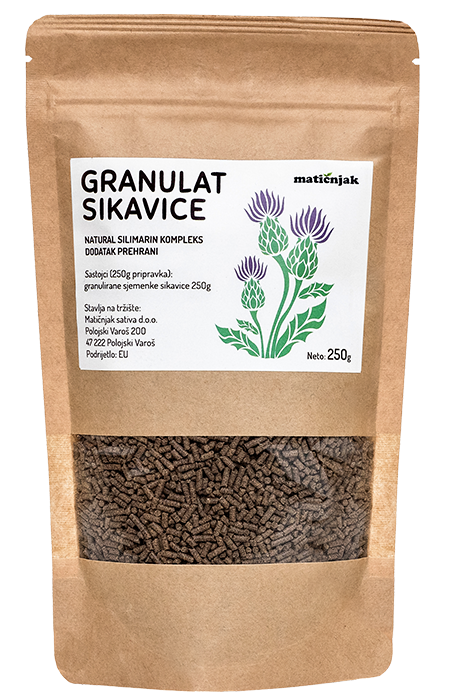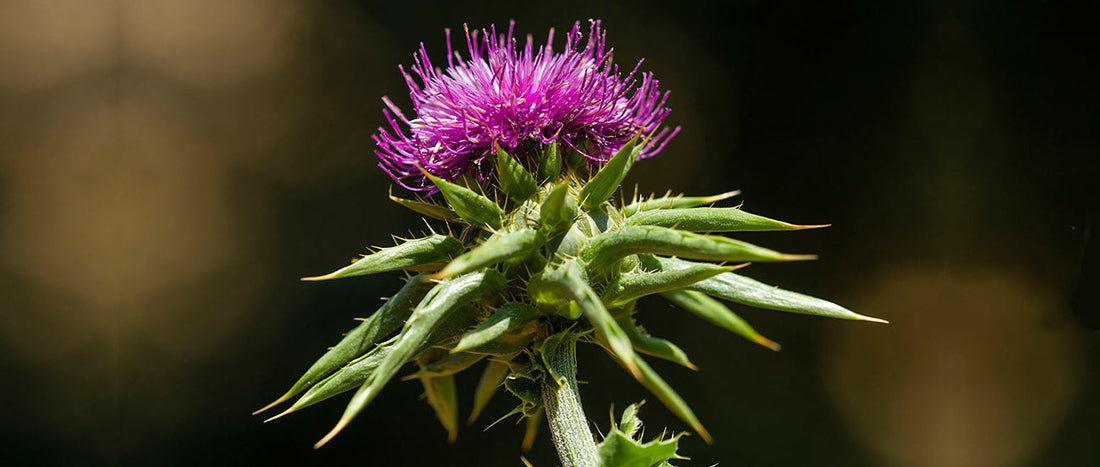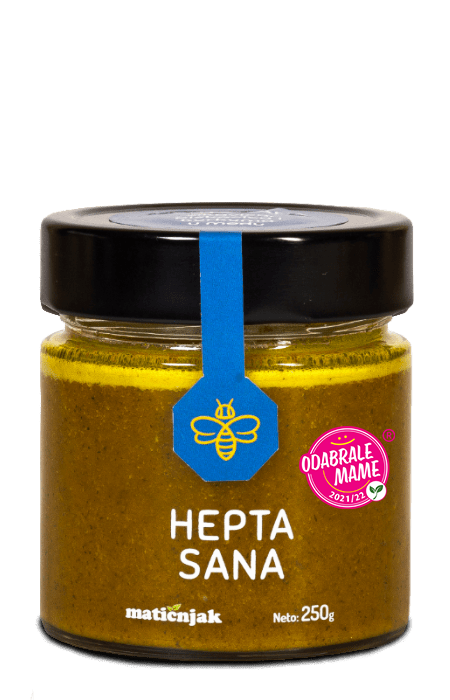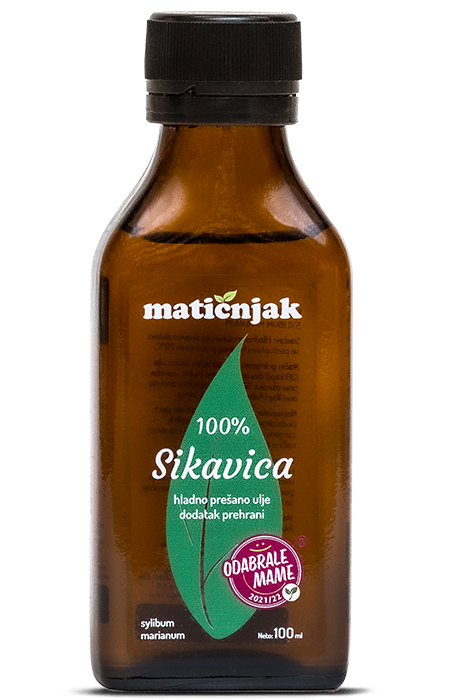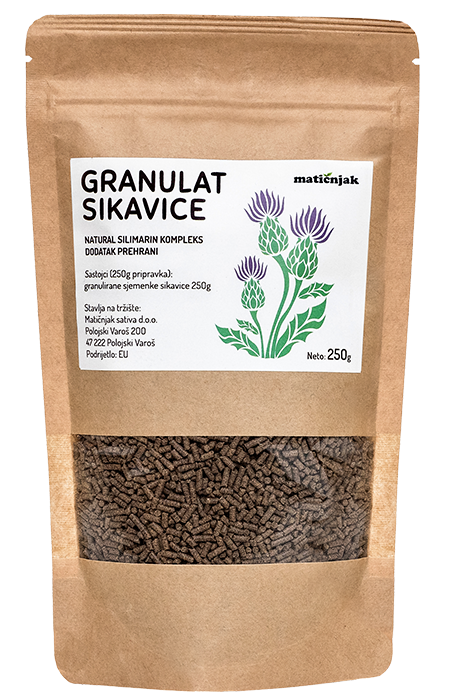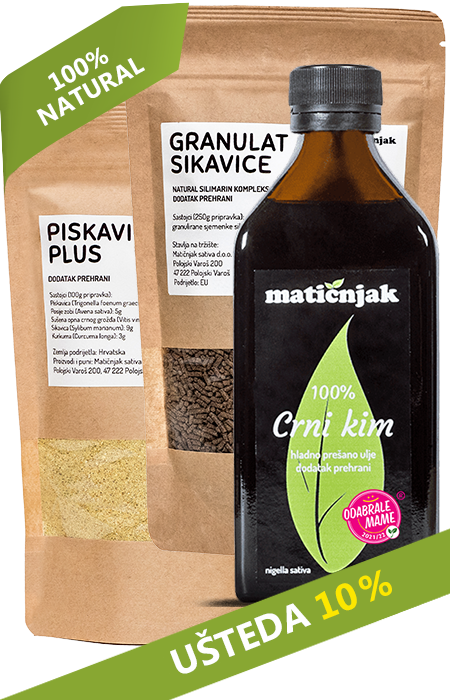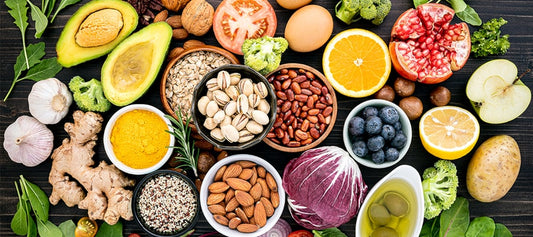Sikavica - yesterday, today, tomorrow
An ancient medicinal plant that has been used for centuries to treat various diseases such as liver and gall bladder disorders. Cultivation of Silybum marianum as a plant with potentially healthy effects dates back to ancient Egypt. Indeed, archeological evidence representing the measles can be found in the Egyptian Museum in Cairo. Not long after, it was grown in Europe, in the Mediterranean, and was used as a liver tonic because it was believed to be able to "open" a clogged liver and spleen, so it was also used as a cure for jaundice (1). Another historical reference to cardamom is found in the Bible, the old Latin name Lebanon cardus. This plant has been used for centuries as a natural treatment for upper gastrointestinal and digestive problems, liver and bile diseases, menstrual disorders and varicose veins (2,3).
A good description of its characteristics comes from the time of Pliny the Elder (AD 23-79): the juice and seeds of sycamore were used in case of snakebite poisoning and melancholic depression, a pathology they considered a "liver problem". The relationship between the liver and mood is really interesting. Metaphysically, the liver is known as the seat of anger, which makes us aggressive and reactive. That is why our well-known phrase “You're going to my liver!” really makes sense. In the meantime, scientists have proven that liver diseases are often accompanied by changes in behavior and mood, fatigue, cognitive dysfunction, and sleep disorders(4.) However, not only diseases are accompanied by emotional changes, but also overstrain of the liver. which belongs to the group of functional problems brings with it an emotional imbalance.

Silymarin - the main active substance from sycamore
Silymarin from sycamore is the first aid when we want to treat the liver or speed up and optimize its function. The main active substance from the medicinal plant sikavica is silymarin. Silymarin is an extract of Silybum marianum or sycamore, and it consists of flavonolignans (silybin A and B, iso-silybin A and B, silycristin and silidianin) and flavonoids. Among these substances, silybin predominates, which has the most important biological effect and which makes up about 70% of the total composition of silymarin. Silymarin is found in the membrane of sycamore seeds and it is precisely the mechanical extract of sikarica seeds that contains large doses of silymarin as well as fiber, without ammonia residues and other neurotoxins.
As the best source of bioactive silymarin, the mechanical granulate of sikavica is smartly combined with lactic acid (yogurt or cream), so that the absorption of silymarin is optimal. The most important role of silymarin is its antioxidant function (increasing the activity of the enzyme superoxide dismutase within erythrocytes and lymphocytes) (5). In addition to antioxidant power, silymarin has immunomodulatory, antiviral, antibacterial and anticancer effects . Positive effects of silymarin have been reported in the treatment of cancerous diseases (8), such as breast cancer (9), ovarian cancer, lung cancer (10), skin cancer (11), liver cancer (12) and colon cancer (13).
Also, silymarin coats the membrane of hepatocytes (liver cells) to prevent xenobiotics from entering the cell. Xenobiotics are foreign chemical substances that do not naturally occur in our body. These include environmental pollutants, hydrocarbons, food additives, pesticides, carcinogens and drugs. These compounds have a number of dangerous effects on the environment and ultimately on people, and the liver is the first to be hit.

Liver - source of vitality and health
The ancient Greeks used the saying that the healthy the liver is, the healthier the whole organism is! That this is the case today has been confirmed by numerous studies on the very work of organs and organisms. The liver is a key organ of metabolism and secretion, continuously exposed to xenobiotics due to its strategic position in the body. Toxins from the digestive tract first enter the liver, which leads to its various disorders, dysfunctions and diseases. For many years, silymarin has been used as a "hepatoprotector", that is, a protector of the liver. Silymarin blocks the binding centers of toxins and thus prevents and hinders their accumulation in the liver.
Recommendation: HEALTHY LIVER PACKAGE (10% discount + FREE delivery)-
The liver filters and detoxifies
Everything that gets on our skin or in our body goes to the liver for filtration. The liver is the largest organ for detoxification and digestion in the body. It is the body's filter – it filters everything we come in contact with; the air we breathe, the food we eat, the water we drink, everything we put in or on our body, all of that has to be processed by the liver. Its job is to protect our body from harmful chemicals, poisons, toxins, poor diet and much more. When we consume food, it is up to the liver to metabolize and eliminate all harmful preservatives, pesticides, herbicides, heavy metals, chemicals, bacteria and many additives that may be present in it.
Recommendation: DETOX package (10% discount + FREE delivery)
-
The liver converts nutrients
In addition to filtration, the liver participates in conversion - converts nutrients from food into nutrients that the body can use, stores these substances and delivers them to the cells when needed. Also, it constantly reflects the level of sugar in the blood, and stores vitamins and minerals. It plays an important role in protein metabolism, converting amino acids from food so that they can be used for energy production.
Recommendation: HEALTHY PANCREAS package (10% discount + FREE delivery)
- The liver nourishes all cells in the body
When the liver is working properly, our blood is clean, free of pathogenic microorganisms and rich in nutrients that feed the cells of our body.. When the liver is congested, our blood is poorly filtered (the primary job of the liver) and eventually becomes laden with toxins and lacking in nutrients. The path from food to the bloodstream is stomach-intestine-portal vein-liver-blood. What we eat goes into the stomach for digestion, absorption happens in the small intestine, then through the portal vein to the liver which finally sends the nutrients (or toxins) into the blood. If the production of bile is compromised by liver damage, this can affect the proper absorption of vitamins A, D, E, K, and B12, therefore it is absolutely wrong to additionally ingest these vitamins in the form of multivitamins because, since the liver is not working properly, it will not even be able to use it in the body.
-
The liver is crucial for hormone balance
There are two main phases during which the liver detoxifies and eliminates toxins. For most people, the first stage works well, while the second stage is usually slowed down. If the second phase does not work efficiently, the toxic chemicals that the liver has to convert further remain in our body longer. It is important to know that it is impossible to be in hormonal balance if the liver works sluggishly. One of the most important functions of the liver is the breakdown and removal of excess hormones from your body, especially estrogen. After estrogen has done its job in the body, it is sent to the liver so it can be broken down and removed through the colon. Unfortunately, if the liver is stressed, then it cannot function optimally and therefore cannot remove estrogen at its normal rate. Thus, estrogen is not metabolized properly and can be reabsorbed back into the body.
-
The liver affects the work of just about every organ in the body
Our skin and mood always signal when the liver is congested or overworked (which means it is tired of neutralizing excess xenobiotics from the environment). When this happens, our defense system goes down. In other words, when the liver is congested or diseased, it affects all organs. The "alarm system" that informs us that the liver is under severe stress or imbalance can be found if you suffer from the following conditions:
- Hashimoto and hypothyroidism
- Diabetes
- cysts on the ovaries
- allergies
- gum bleeding
- sleep problems, frequent night awakenings
- high cholesterol and blood fats
- elevated ALT and AST liver enzymes
Recommendation: HEALTHY LIVER PACKAGE (10% discount + FREE delivery)
- PMS
- memory problems, cognitive dysfunction
- digestive problems (bloating, constipation)
- obesity, overweight
- hormonal imbalance - estrogen dominance
- acne, eczema, blemishes, skin dryness and itching, psoriasis
- express fatigue and lack of energy
Recommendation: DETOX package (10% discount + FREE delivery)
How to help the liver and improve its function?
Sikavica as a medicinal plant has successfully influenced the work and function of the liver for thousands of years. Few medicinal plants work so skillfully on its recovery and improvement of function, which directly affects the health of the entire organism. Along with sikavica - silymarin, it would be good to include fiber in the diet, as well as other bitter substances such as arugula and broccoli. Mechanically granulated seeds of sikavica ( GRANULAT SIKAVICE ) contain both silymarin and fibers and thus greatly affect the detoxification of the liver and intestines. Genetics also play a big role in the speed of the detoxification process, so someone will benefit from a smaller dose of sikava, while another will need a larger dose. It is necessary to take care not to consume the entire daily dose in one dose, but to divide the daily dose into two - it is best to take it in the morning and in the evening. In any case, sikavica is completely safe to use, with no unwanted side effects.
Find references to scientific works on the effect of the ingredients of this product HERE.
Ivo Bačlija, herbalist, apitherapist
+The information and statements are for educational purposes and should not replace your doctor's advice.
